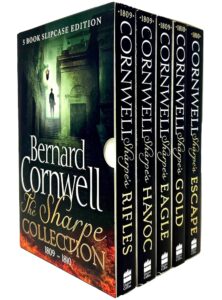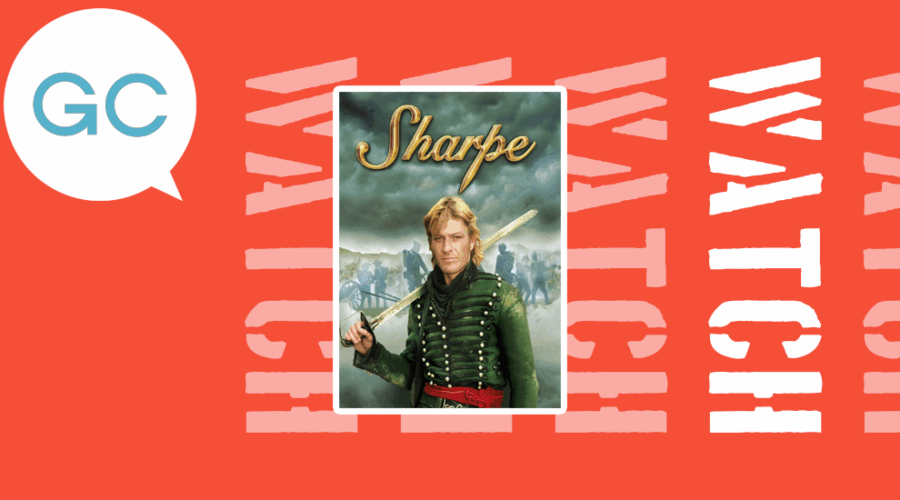 Sharpe is one of Cornwell’s most beloved characters, even for people who have never read the books (of which there are over 20), and Bean’s performance in the TV series is a huge part of that.
Sharpe is one of Cornwell’s most beloved characters, even for people who have never read the books (of which there are over 20), and Bean’s performance in the TV series is a huge part of that.
Of course, Sharpe is an unforgettable hero in the books, but Bean does such a great job of bringing him to life that it helped Sharpe reach a whole new audience who perhaps might not have otherwise been interested in reading historical military fiction.
If you haven’t read the books, I’d recommend reading them chronologically, although that’s not the order in which they were written. Don’t be put off by the military aspect of the books: they’re really adventure stories, some of the best I’ve ever read.
The story of Sharpe is compelling: he’s an outsider in the army but earns his place through courage, cunning and sheer stubbornness.
The books begin with Sharpe’s early career as an infantryman, whereby he fights his first battle in Flanders before being sent to India and thence onwards to Europe to fight against Napoleon.
Sharpe is no ordinary hero but instead is a bit of a rogue who only enlists in the army to avoid a murder charge. After he saves the life of Arthur Wellesley (the future Duke of Wellington), Wellesley gives him a battlefield promotion from the ranks and he goes on to have a successful army career.
One thing I love about the books is how they act as a counterpoint to, for example, Pride & Prejudice, where the redcoats are gentlemanly objects of desire (at least for Lydia), whereas the Sharpe books feel like the flipside of that setting, full of grit, adventure and camaraderie.
Cornwell is surely one of the best writers of historical fiction: every detail is meticulously researched and he brings the era to life in the most fascinating way.
I think he’s unrivalled in terms of his ability to write battle scenes – you can feel the terror of the men as they line up against the French or rush into the breach, and his battle – and combat – choreography is exceptional. As you’re reading, you feel like you’re there with Sharpe and his men in the sprawling chaos as the smells of gunpowder smoke and blood practically rise off the page in front of you.
The experience of reading a Cornwell battle couldn’t be further from visiting a historical battle site and struggling to imagine what happened there when all is peaceful and quiet.
Sharpe himself is such a great character: he may be a rogue, but he has a quiet integrity and his own code of honour that informs his every decision.
He has plenty of depth too. Born to a prostitute in the rookeries of London, his fellow officers – generally aristocrats who have purchased their commissions rather than earned them through competence or skills – despise him for his beginnings, as well as for his achievements.
We see Sharpe put in some impossible situations as the series progresses but he always finds a way to triumph, and while he remains ruthless he is also fiercely loyal to those he loves and respects.
Over the course of the series we see Sharpe fighting in India and all the way across Europe from Portugal to Belgium, including at the battles of Trafalgar and Waterloo. Cornwell has a great flair for describing landscape and setting as well as action, which gives the books a pleasing balance, and he’s brilliant at plotting and pacing too. The books keep you turning the pages to find out what happens next but without ever feeling rushed or leaving anything underdeveloped, which is quite a fine line to tread.
If you’re looking for a new series to read, full of adventure and rich in historical detail, the Sharpe books could be the perfect choice.
Sharpe on TV
When it comes to the TV series, interestingly enough, Sean Bean wasn’t the original Sharpe – another actor was chosen for the role but was injured filming the first episode, so was replaced by Bean.
The way in which he perfectly embodies the role and the fact that so many readers of the books also picture him as Sharpe is a testament to his performance in the TV adaptation, which started in the 1990s. If you’ve only seen him in Game of Thrones or more recent series, he’s just as brilliant as a young actor as he is now.
As the books progressed, Cornwell found himself changing details in Sharpe’s description to more closely match Bean, and even added a Yorkshire element to his backstory to account for Bean’s accent, so synonymous with the character was he. His performance in the role is perfect – he’s compelling to watch, and he manages to show a very human side to Sharpe, with flashes of uncertainty made clear without any lines being required.
In the books, Sharpe has more rough edges, and he’s more brutal than he is on TV, but grounding the TV character in the friendship with Harper and the camaraderie with his men makes for great viewing. The action in the series is also smaller in scale – the grand action of the battlefield is harder to translate to TV without a prestige budget, and this was made before the era of prestige TV that we’re all so used to today. There’s more romance and what we might think of as traditional heroism in the series too; the books simply have more space to add nuance and complexity to both Sharpe as a character and to the overall storylines.
Each of the TV episodes is long – movie length, in fact – and condenses the books into a more accessible story. They’re eminently watchable even if you have no knowledge about the period and if you’ve never read the books. The locations, sets and costumes are all beautifully done and help to bring the period to life visually.
As in the books, Sharpe’s friendship with Patrick Harper is one of the standout details, and in the adaptation it really grounds the action and plot in friendship and humour.
The baddies in the series are brilliantly cast – there’s perhaps a bit more subtlety in the books, although they’re just as hateful, but there’s something about the immediacy of the screen, great casting, and great acting that makes the bad guys people you love to hate and not just evil, sinister presences as they sometimes are in the books.
I’d recommend reading the books before watching the series in this instance, not so much because the books are better, but because they have more depth and are more extended, whereas the TV series is necessarily condensed in scope.
I found it more enjoyable being able to watch the series already knowing the backstory of each one from having read the book – somehow it makes the viewing more fun.
If you love a hero who doesn’t mind his manners, isn’t any kind of a gentleman, is fiercely loyal to his friends but ruthless with his enemies, then Sharpe’s your man.
Do you have a favourite fictional hero? If so, let us know via our social channels!

